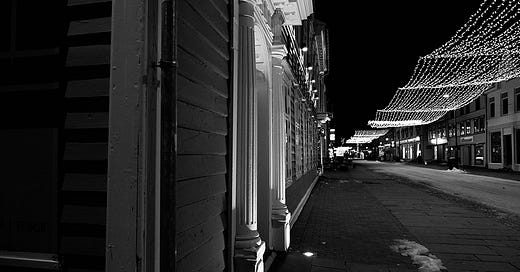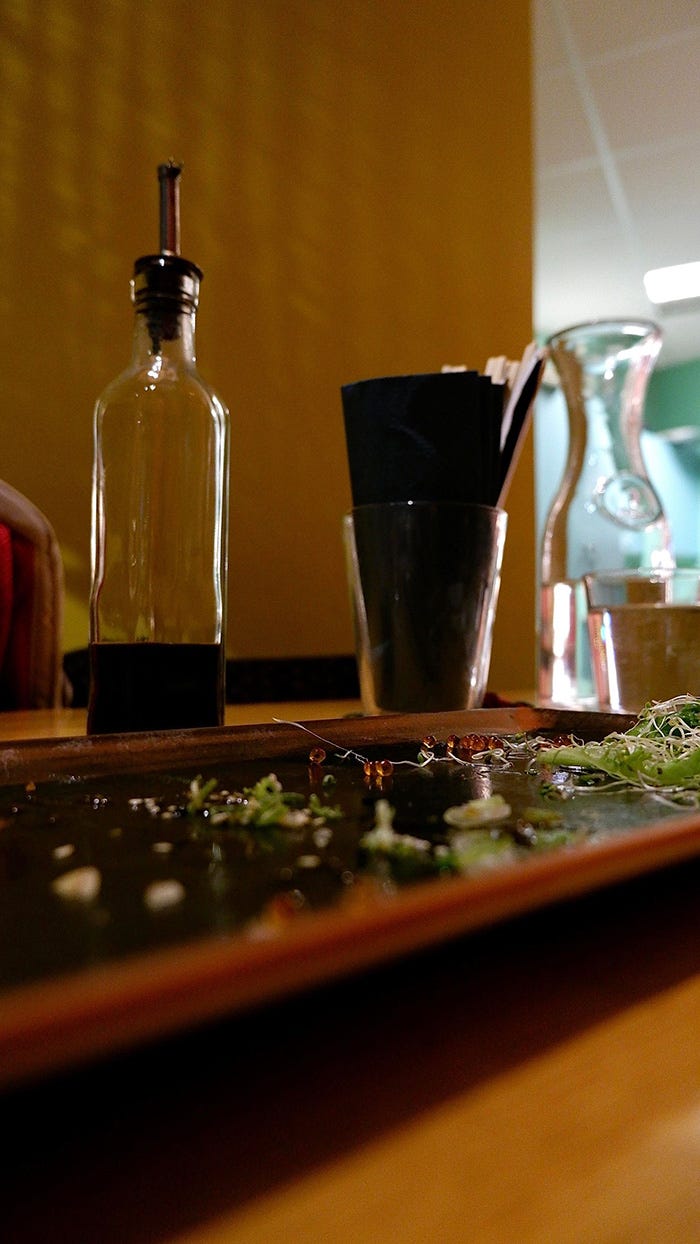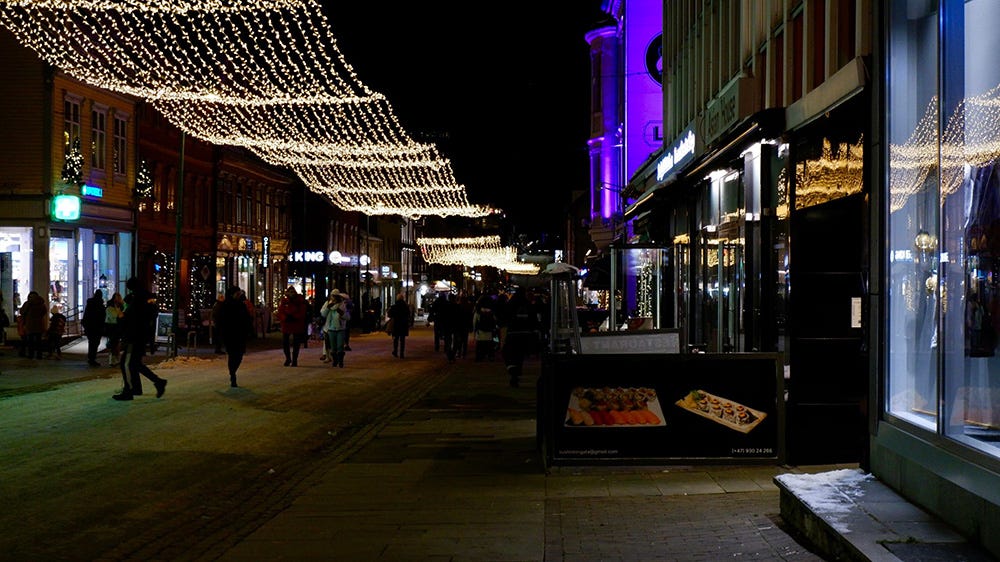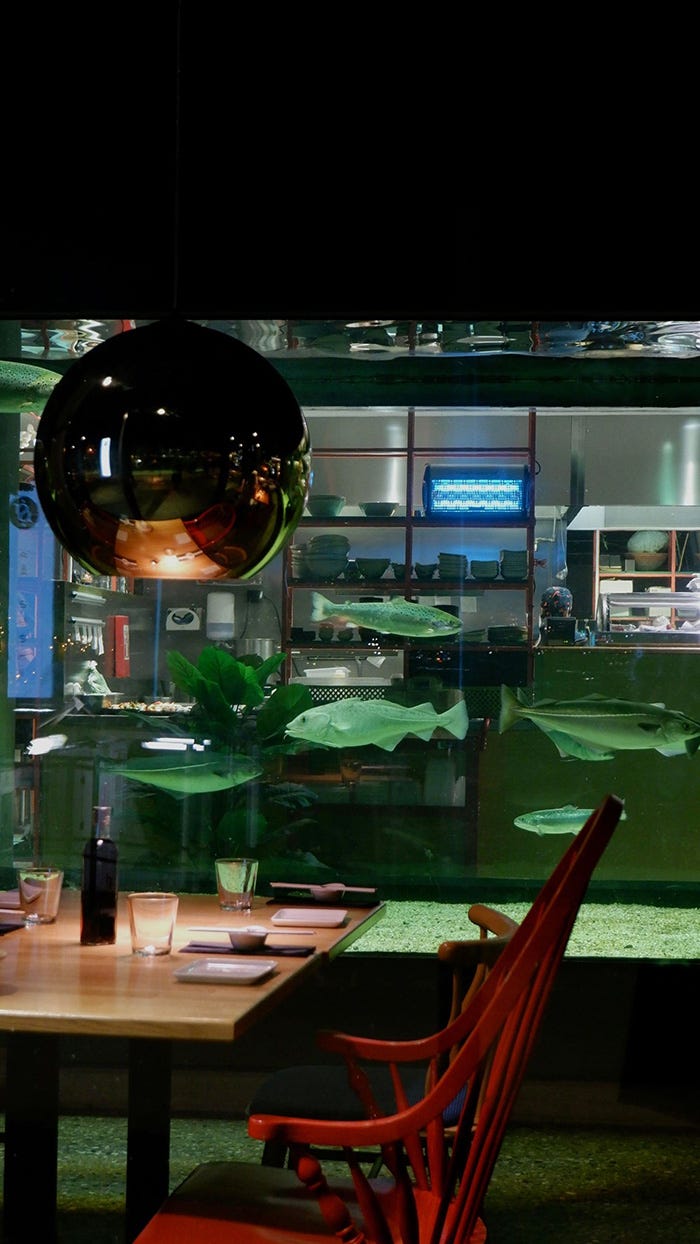Sushi North
"I was alone in a faraway city. I wanted a quiet restaurant with a big window, to watch people drifting along the streets in all their shiny happiness."
*Note: Every so often I like to pull up something from our archive. We published some incredible work in our first year, and I want to make sure our newer readers get a chance to see some of it. I’ve had a particular craving for this story lately, which appeared on Juke in December 2022. It must be something about the summer heat, I just want to lose myself in Damon’s world of winter-chilled European cities and his perfectly distilled story of one night’s wander… —Tonya M
If you want to eat well in a strange city, the street to avoid is the one with all the restaurants. I don’t travel in cities that often. All cities are strange to me. That confessed, I’m an experienced enough traveler to know that if you dine at most restaurants on the restaurant street, you’ll get what you expect. Pizza, chicken cooked eight ways, hamburgers, chips & salsa, salad, and mediocre renditions of whatever food a restaurant claims to specialize in—Mexican, Thai, Italian, write your own list.
It’s also not a given that you’ll hit the good spots when you wander. You might or you might not. One rotten egg floating in your bowel of ramen at the alley ramen bar will steer you away from alley dives for a considerable stretch. But then you could also end up at an Indonesian restaurant in the redlight district of Soho, where the food is more than worth the creep through the carnival of our shared maladies.
The carnival, so to speak, tends to be more discreet in northern cities. Scandinavia is not Europe. Scandinavia is Scandinavia. A northern friend of mine once told me how she has a Spanish friend who likes to hug her each time they meet. She describes his inclinations as being “so Continental.” Naturally there is room for other interpretations. For instance, I wouldn’t mind hugging my friend each time we met either, and I am far from Continental. Hugging as friends in Scandinavia, unless you have known each other since kindergarten, tends to be off limits, or Continental, as it were. My point is you might not find your desired edges while wandering in a Scandinavian city, at least if you’re searching for food. The countryside is a bit different. I could speak of dried reindeer heart, lutefisk, cod tongue, or the real delicacy of the cod, the cheek meat. Cuisine in the north can be, well, esoteric.
For the record, I don’t know how to pick places to eat. I mostly pick by my mood, which is unreliable. If I am feeling spirited, I will, with pleasure, accept the fiscal damages of a posh French bistro in some northern town. If I feel a bit saucy, I will eat at the grittiest kebab stall I can find. I enjoy affecting the “man alone” character in a big town. To substantiate my performance, which can be described as Bogartian, I might find a quiet restaurant with a big window. I will sit at the nearest table in front of the big window. I will sip at a cup of coffee, cradling the mug between my hands like a broken heart, and watch people drifting along the streets in all their shiny happiness. The food doesn’t matter. Underwriting the mood comes first. But then three weeks ago I walked into a sushi dive and discovered a sweet spot between art and life.
There were three restaurants and three bars on the street. The other doors opened to either retail shops or housing. Of the three bars, two of them claimed to be English Pubs. I don’t remember how the third bar advertised itself. One of the restaurants was a kebab shop, I think. I had to check twice. The colors and decorations in the kebab joint looked like a toy store. But I ate kebab the night before at a spot two blocks from the hotel where I was staying. It was good food, too, a Doner Kebab, spicy. Another restaurant option was called A Taste of India, which was dead empty except for 20 perfectly set tables. The restaurant seemed open for business, but everything was downstairs, which meant from any table I would only see passing shoes and not the people wearing them. The third restaurant, the one I picked, was the sushi dive.
There were five tables in the place. The walls were newly painted in some generic, drab olive color. There were two fake palm plants and two photographs of some Asiatic homeland. A white sand beach. Blue, plastic looking water. Lush hillsides. A lotus flower. I was the only customer. There was a counter upfront, and behind it and off to the side, a lean man just on the outside of middle age sat cutting fish. Next to him was a platter of sushi rolls. An older woman entered from a backdoor. She nodded at me. I went up to the counter. She asked if I wanted take-away. I told her no and picked up a menu. It all looked the same. I pointed to three rolls—one salmon, one tuna, one scampi—making sure there was no majones (mayonnaise) or cream cheese (cream cheese) stuffed between the fish.
“Drink?”
I shook my head.
“No drink?”
“No drink.”
I selected a table nearest the front window. I sat down and looked across the street into the kebab shop. I glanced back at the counter, and the old woman was gone. The man sat in the same place, head down, slicing fish, I assumed, but I couldn’t see his hands.
I turned back towards the window. I felt calm enough, settled enough. The world was right out there and I was right in here.
This was almost the moment I wanted, the moment when the I that is in me could take shape again. A little lonely, a little pathetic, a little okay that I will never live up to anyone’s dream, least of all my own. But I could not think about these things too much. I was alone in a faraway city. I was smartly dressed for no one. Now and then I scribbled in a pocket notebook that I kept half concealed in the half cradle of my right arm. The window before me, and outside, people promenaded about the streets in their winter best—fine knitted hats, fitted wool sweaters, and dark shoes with the laces configured just so. Some people walked as friends, some walked as lovers.
I recognized the lovers easily. I saw all their saturated hopes and promises and the vital bliss of who they are now. The condition is not so much that one of them glows or the other glows. Instead, they glow as something they cannot be on their own. I like them. I will imagine their beginnings. I will see them in their moments of laughter at what they believe only they will find funny. And it’s true, too, what they believe. Their eyes do not see what others see. Yet I will see them hesitate before they eat, catching and forgiving the insecurity in each other’s eyes. Perhaps this will happen before sitting in front of another window in another faraway city, knowing, as only they will know, that in this moment they belong to each other, not even to the world that holds them. I will see these moments for them. I will sing their songs, and their songs will become ours.
I did not hear what she said, if she said anything at all. The old woman from behind the counter announced my food was ready. I went over to the counter where my sushi rolls, all 16 pieces of them, were neatly arranged on a couple of plates. There was a tiny plastic cup set to the side of the plates, containing a few slivers of pickled ginger. There was another tiny cup filled with soy sauce. I felt certain I would spill the liquid. There was a smear of wasabi on the plate with the tuna rolls. The old woman motioned with her hand, indicating where the bins of forks and chopsticks waited. I grabbed a couple of sticks and headed back to my table. I set the tray down and felt comforted by how unremarkable everything appeared. The damned squareness of it all. I didn’t eat just yet. I unsworded the sticks from their paper holder and set them beside the tray and stared outside again. Love was gone. But there was a tall bald man, dressed in faded, loose fitting blue jeans, and a black puffy coat, smoking a cigarette. He leaned against the wall outside the bar I couldn’t name.
Then you realize something or something once more. You are merely a man passing through, not even a stranger in a strange land. Not much of anything at all. Grace could be found in the window here. With the lights outside and all that forever that is not forever. Far from it.
The sushi hadn’t gone anywhere. I grabbed my sticks and maneuvered a piece of salmon around and in between the sticks. The thing with sushi, for all the trimmings—the soy sauce, the pickled ginger, the wasabi, the Sriracha sauce back at the counter—I still take my first bite as the sushi lies. In went the salmon.
You can’t be sure with sushi, like you can with some other foods. The fish could be gluey. The rice could be dry, tasteless. A red dab of roe could be off. But this piece of sushi, this kan of sushi in this lackluster dive closer to the end of the world than to the equator gave me pause. What is this? I glanced to one side and then the other and then out the window. Had anyone seen this? Every moment in the sushi hummed its own undefiled flavor. The salmon tasted like salmon caught fresh from a cold river. The rice wine vinegar dribbled onto the rice tasted bright but not overpowering. The wrap tasted of some exotic sea. My god! It was perfect.
After I finished that piece of the sushi, I ate another. More wonder. When I finished a third, I turned around to look towards the counter, and there, on his stool, the lean man sat staring at me, the corners of his mouth already shaping into a smile. The magician had made a precise sleight of hand, and the magic was more real than the trick. I held his eyes for just a moment. We both knew. I turned back to the window with this understanding between us. He was the sushi master, and I had wandered into his cave.
I finished eating the rest of the sushi, taking my time. I thought about ordering a cup of coffee and hanging around a while longer. Except I wanted to walk the streets again. I wanted to imagine being in the sushi dive and eating again the sushi I had just consumed. I wanted to imagine turning around and recognizing the sushi master for the magician he actually is. I wanted to imagine and experience the feeling of being alone in a dive without a care, as though I lived some other life and some other story that could be painted. It was not very late but late enough that a new crowd would be around town. The people who were out earlier would be in restaurants now, including the lovers. All that light and wonder. As though somehow they had made a world. None of them would be on the restaurant street, though if I was lucky, l would see them.
Damon Falke is the author of, among other works, The Scent of a Thousand Rains, Now at the Uncertain Hour, By Way of Passing, and Koppmoll (film). He lives in northern Norway.
If you enjoyed this post, hit the ♡ to let us know.
If it gave you any thoughts, please leave a comment.
If you think others would enjoy it, hit re-stack or share:
If you’d like to read more:
And if you’d like to help create more Juke, upgrade to a paid subscription (same button above). Otherwise, you can always help with a one-time donation via Paypal or Venmo.










Thank you for this piece. We just returned from dinner at our local sushi place and, after reading your description, realized just how tasteless sushi has been for me in the many other sushi joints too. sigh It's hard getting good fish in the Great Basin.
thanks for reposting this. its a gem!